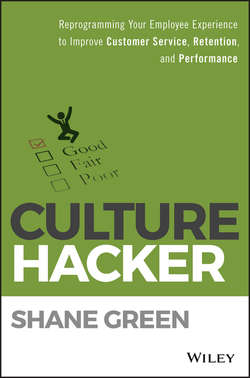Читать книгу Culture Hacker - Green Shane - Страница 6
На сайте Литреса книга снята с продажи.
1
CULTURE
MORE THAN JUST AN HR THING
ОглавлениеBrand is just a lagging indicator of a company's culture.
– Tony Hsieh, CEO of Zappos10
Every owner, executive, and manager is responsible for his or her team, department, or company culture. No excuses. Culture is no longer just a human resources (HR) priority or thing; it is a fundamental business thing.
Culture is the collective mindset and attitude of your employees. The mindset your employees bring to work every day determines how they will take care of your customers, how much effort they will put into their work, and whether or not they will stay with you long term. The impact of a negative culture within an organization is tremendous. Poor customer interactions, high turnover, and under performing employees cost organizations – depending on their size – thousands, millions, and even billions of dollars. The research from across industries is clear: when your employees are more engaged, your company is more productive and profitable; leading to better shareholder returns. Culture is the most important business thing today.
When it comes to culture, the question is not “Do you have a culture?” because you do, and every company does. The real question is “What type of culture do you have today, and is it meeting the expectations of your owners, customers, and employees?” This question really is at the heart of what every manager must consider: Is your culture making your business better, delivering the desired individual and team performance, turning customers into fans, and causing your best people to stay? If it is not, know that there are things you can do to change your culture to where you and your staff want it to be.
Many owners, executives, and managers focus their energies and investments on business, financial, operational, or marketing strategies, but the reality is that a culture strategy will have a greater impact on your business than any other thing. Peter Drucker's phrase “Culture eats strategy for breakfast”11 is probably more relevant in business today than ever before. Employees are the ones defining your business, it's value and reputation, and for that reason, the ability to attract, retain, enable, and maximize your talent is critical for your business today.
Culture is a business thing, and all owners, executives, and managers must be involved (along with HR, if you have that department) to get the right culture in place for your business. According to Jay Haines, founding partner of Grace Blue, a global executive search company, “The cultural piece is to my mind now the single most important component of any chief executive role.”12 Now, the problem I see in many organizations is that culture is just an HR responsibility. Whether I'm speaking with an owner, executive, or manager, when I ask who is responsible for the company's culture, the person almost overwhelmingly says “human resources.” This is the first problem I have with many organizations and the people running them today – they are leaving the task and responsibility of employee attitude up to a single person or team, when, in fact, it is everyone's responsibility. As HR expert Michelle Crosby recently stated on our Culture Hacker podcast, “Culture needs to be owned by leaders at every level. Human resources has to play a role as a facilitator of that process, but not the owner of that process.”13 So with HR acting as the facilitator, everyone else must take on the responsibility of creating, supporting, and delivering an employee experience that instills a positive mindset, a delight in serving others, and a desire to make things happen.
Now, if you are an HR manager or, in fact, any manager who views culture as a priority, you may be nodding your head in agreement, but I bet you are also thinking about those owners, executives, or managers around you who need some convincing. So let's consider in more detail the three areas where I think culture is most strongly impacting your business's profitability and performance today: your customer experience, how much effort your people put into their work every day, and your ability to retain your best and brightest people.
10
Tony Hsieh, Delivering Happiness: A Path to Profits, Passion, and Purpose (New York, NY: Grand Central Publishing, 2010), p. 151.
11
Quoted in Shep Hyken, “Drucker Said ‘Culture Eats Strategy for Breakfast’ and Enterprise Rent-A-Car Proves It,” Forbes, December 5, 2015. http://www.forbes.com/sites/shephyken/2015/12/05/drucker-said-culture-eats-strategy-for-breakfast-and-enterprise-rent-a-car-proves-it
12
Quoted in Katie Richards, “5 Tips for Building a Real and Successful Company Culture,” Adweek, March 24, 2016. http://www.adweek.com/news/advertising-branding/5-tips-building-real-and-successful-company-culture-170383
13
Culture Hacker podcast, 2017. Season 1, Episode 4. On-air talent includes: Michelle Crosby, Shane Green.
